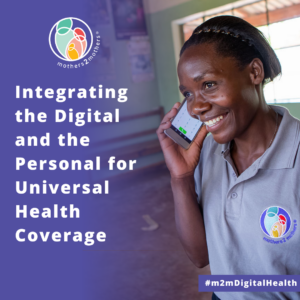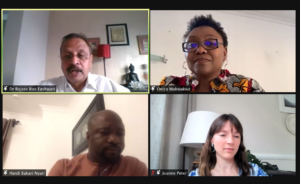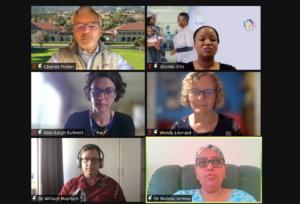Integrating the Digital and the Personal for Universal Health Coverage

“Our expertise and on-the-ground knowledge make us key thinking partners in the future of digital health.” – Wilbroda Awuor Akuro, m2m Community Mentor Mother Team Leader
On 10 November, mothers2mothers (m2m) convened an online event to discuss how best to harness the power and potential of digital health in guaranteeing health for all. With more than 300 registrants across four continents, and over 20 diverse and insightful expert speakers, the event brought together frontline health workers, government officials, United Nations agency representatives, academics, researchers, and implementing organisations from around the world…all united by a shared goal to deliver Universal Health Coverage (UHC) by 2030.
“The World Health Organization Strategy 2020-2025 states that digital health technologies can help improve health for everyone, everywhere. But we also know that they alone are not a magic wand to addressing health challenges,” Honorable Dr. Jane Ruth Aceng Ocero, Minister of Health for the Republic of Uganda—and the guest of honour for the day—told the gathering.
This theme—an acknowledgement that delivering UHC depends on successfully integrating digital and in-person health services—ran strongly throughout the programme. COVID-19’s effects, both positive and negative, were another touchstone. “COVID-19 has the potential to act as an accelerant towards our shared goals—for today, the concept of universal health coverage lives in public consciousness like no other time in recent memory. If we can capitalise on this awareness and momentum, we have the ability to deliver meaningful change,” said m2m’s President & CEO Frank Beadle de Palomo in his opening remarks.

Dr Rajeev Rao Eashwari, Onica Makwakwa, Bakari Hardi Nyari, Joanne Peter
To ensure digital health tools can reach their full potential, many of the panelists underscored how critical it is that they are designed with significant and meaningful input from both the communities and health workers that will use them. “We need an anthropological approach to developing digital health solutions, which recognise the various socio-economic situations of countries,” said Dr. Wuleta Lemma, Honorary Associate Professor and Director, Center for Digital Health and AI, Wollo University; and CEO, Lalibela Global. m2m Community Mentor Mother Team Leader, Wilbroda Awuor Akuro of Kenya, explained the importance of including frontline health workers in the process: “We know what challenges and opportunities our communities face and what tools we need to best support them tackle those. That is why, on behalf of my fellow mothers2mothers Mentor Mothers, I would encourage everyone today to involve us more in the process—with our buy-in and our access, we can make these tools more effective and used more widely by all.”
Barriers to progress that will need collaboration across sectors to tackle were also top of mind. Among the top challenges cited by the panelists were a lack of Internet access and low digital literacy rate, particularly in low-resource and rural communities that struggle most to access healthcare and would benefit from these digital tools. “Digital health can help drive Universal Health Coverage, but we must recognise that many digital health services don’t work for billions due to low-resource settings, low to no internet, and low digital literacy,” said Rich Bryon, Chief Strategy and Marketing Officer, reach52.
m2m Mentor Mother Lucy Mukami from Kenya explained how these challenges play out in the field. “The Internet can be unstable and most of our client do not have money to buy (data) bundles. We are unable to reach them on WhatsApp and other platforms when needed,” she said.

Charles Prober, Shombi Ellis (moderator), Kira-Leigh Kuhnert, Wendy Leonard, Dr William Mapham, Dr Wuleta Lemma
Finally, many panelists stressed the importance of making sure digital tools are sustainable and designed for the long-term. “Investing in digital health technologies is a lifelong commitment and can’t be a one-off. We have a very small window of opportunity to seize the moment and really drive Universal Health Coverage,” said Dr. Renata Tallarico, Youth Team Lead and SYP Regional Coordinator, UNFPA East and Southern Africa.
This is just a snapshot of the rich conversations on the day, and recordings to different sessions of the event are included below. At m2m, it is our great hope that by sharing emerging learnings and identifying key unanswered challenges, we can contribute to charting a path forward towards achieving Universal Health Coverage. We hope that this gathering will help to catalyse new thinking and new partnerships, and help to create a healthier, more equal world.
Poet Mumbi Macharia summed it up perfectly: “The importance of digital health cannot be understated, easing communications between doctors and their patients, collecting information from the most vulnerable from their phones, their own homes. This is how the future is being designed and no one deserves to be left behind. Love is a verb as much as it is a noun. And so this is a call to action. Healthcare for all shouldn’t just be a snappy Instagram caption.”
Our thanks to all our speakers and participants, but most especially to the Shapers Council for the event:
- Justine Mirembe. United States Agency for International Development (USAID),
- Carl Bjorkman, Bill and Melinda Gates Foundation,
- Dr George Owuor Matete, BRAC,
- Dr Joanne Peter, Johnson & Johnson,
- Dr Kathrin Schmitz, mothers2mothers.
- Jyoti Shankar Tewari, United Nations Population Fund (UNFPA)






















